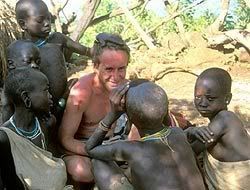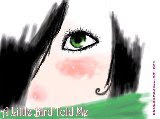un pensamiento para ti...
~ Gabriel Garcia Marquez
an incredible effort from BBC...
I'm practically hooked on BBC's new series.
No, it's not a drama, but a series of human anthropology documentries, featuring explorer Bruce Parry's journey into the little known world of some of the most isolated tribes in the world. Ranging from Papua New Guinea's Kombai tribe, to Africa's Babonga tribe, to the Mongolian normadic tribe, Parry lived for over a month with each of these 9 tribes, attached to a family and getting initiated as part of the community by the end of each of his stays. It's all documented, and it's breathtaking and simply amazing to watch.
Simply, this new series is called "Tribe".

The thing I really like about this documentry is how it goes deep into the lives of these people as opposed to many other anthropological documentries which often looks at these cultures from a third person's point of view. I mean, Parry is really living their lives, and experiencing first hand what it is like to be part of the tribal community. He endures physically and even emotionally painful initiation rituals, roughs it out with the men on their hunting trips, treds barefooted through jungles and forests, herds goats, sheeps and yaks, gets caught in middle of a war between 2 tribes and battles nature's elements just like the tribes do in their own, normal ways of life. And fortunately, unlike crappy reality shows, Parry takes it all like the ex-Marine he used to be - with poise, resilience and nothing but respect for each of these cultures. It's no wonder the people were often willing to impart their skills, their knowledge of their surroundings, and their beliefs to this white man, and basically accepting him as part of them.
In fact, like what one of the Suri tribe men told Parry, as Parry has quoted in an interview on BBC's website, "We hate some people who come to visit us. We let them in as they bring in goods and cash, but we feel that they look down on us and just want to take our photographs and leave. They seldom interact. But you... You live with us. You sleep with us. You drink blood with us. This is what we want. This is good."
One particularly memorable moment was when Parry agreed to go through the rite of passage which involved the ingestion of a poisonous bark with hallucinogenic properties for 2 days straight, leading to disorientation, hallucination, and suppressed memories/emotions being evoked. To get a sense of how potent this is, here's a description of the drug as can be found on the official website:
"The Babongo have a powerful reputation as sorcerers, and inspire awe in the Bantu for their knowledge of the forest. At the heart of this status is their knowledge of Iboga, a powerful hallucinogenic plant central to the Babongos' beliefs.
... The Babongo cultivate the drug Iboga for their ceremonies, and worship it as the source of spiritual knowledge. Some Bwiti scholars believe it is the Tree of Knowledge from the Garden of Eden. It comes from the bitter root of the Iboga tree, and is a powerful psycho-active drug - something like LSD, mescaline or amphetamines. Taking Iboga brings a sense of anxiety, extreme apprehension and visual hallucinations - effects which can be made stronger by darkness, ambience and suggestion. It makes you violently sick, can lead to a state of lethargy lasting four to five days and, in extreme doses, it can kill.
When Bwiti shamans eat Iboga, they are granted the power to see the future, heal the sick and speak with the dead. The Babongo use it as a stimulant before hunting and during initiation ceremonies. They believe that Iboga frees your soul to leave your body and go on a great journey, to speak with the spirits of animals and plants."
And this was what Parry went through for the initiation:
"The three-day initiation ceremony is used for spiritual or personal development, and to become a man. First the initiate eats the sliced root of the Iboga tree over a period of hours, monitored by his Bwiti father, and the visions begin. The Iboga allows him to see into his true self and vividly revisit the consequences of his past actions. After 24 hours of this, the initiate is taken to the river by the men. They lift him through a construction of twigs shaped like a vulva suspended over the water, then wash him with water soaked with leaves. The men pull a sapling of the sacred matombi tree from the forest, and plant it outside the Bwiti temple - it represents the initiate as a child. Throughout the day the elders feed him small pieces of Iboga, and the whole village perform, dancing in vivid costumes, in a way designed to bring on further hallucinations.
In the last phase, the initiate is called upon to see the Bwiti visions. Fire dancers sprint the length of the village to entice the Macoi spirits from the darkness of the forest. The initiate must tell the elders what he has seen; this is sacred knowledge, known only to them, and through it he becomes a man. The villagers meanwhile plant a forest around the matombi tree, to represent the problems to be faced in adult life. Together, the men break up the trees branch by branch to symbolise the removal of all his problems.
As well as influencing religious belief across Gabon, Iboga is also of increasing interest to Western medicine. One of its active ingredients, ibogain, has been used to treat heroin addicts, alcoholics and people who have been traumatised in childhood. Advocates say its particular powerful effects allow those who take it to move on from their previous lives and habits."
Nevertheless, it's just great to watch such harmonious and respectful human interaction captured on camera.
"Tribe" is now showing on Discovery Channel, and that is channel 12 on Singapore's Starhub Cable!
Visit the official website here, which is not only interesting but also very informative, including lots of information on the cultures of the tribes which Parry has lived with.
Monday, October 16, 2006
|
Labels:
Information
|
My Flixster Ratings
Comments (Movies/TV)
- A City of Sadness (Taiwan)
- Alan and Eric Between Hello & Goodbye (HK)
- American Psycho (USA)
- Are You Being Served? (UK) (TV) (BBC)
- At Last, The 1948 Show (UK) (TV)
- Batman Begins (USA)
- Beyond The Sea (USA)
- Brokeback Mountain
- Cageman (HK)
- Children of Men (UK)
- Chumscrubber, The (USA)
- Constant Garderner, The (USA)
- Darjeeling Limited, The (USA)
- Das Weiße Rauschen (Germany)
- Donnie Darko (USA)
- Door In The Floor, The (USA)
- Dying Young (USA)
- El Dia Que Me Amen (Argentina)
- Empire Of The Sun (USA)
- Fall, The (USA)
- Fearless (HK)
- Felicidades (Argentina)
- Forbidden Kingdom, The (USA)
- Gangs of New York (USA)
- Gattaca (USA)
- Good Bye Lenin! (Germany)
- Goodies, The (UK) (TV) (BBC)
- Hairspray (USA)
- Heaven (UK/Italy)
- Idiocracy (USA)
- In My Father's Den (New Zealand)
- Jamie's School Dinners (UK)(TV)
- Joyeux Noel (France)
- K-PAX (USA)
- Keeping The Faith (USA)
- King And The Clown (Korea)
- Last Of The Mohicans, The (USA)
- Love In The Time Of Cholera (USA)
- Love Letter (Korea)
- Machinist, The (USA)
- Mannequin (USA)
- Martian Child, The (USA)
- Mind Your Language (UK) (TV) (ITV)
- Monty Python's Life of Brian (UK)
- Mysterious Skin (USA)
- Narco (France)
- Nell (USA)
- Newsies (USA)
- Only You (Korea) (TV)
- Pretty In Pink (USA)
- Proof (USA)
- Rory O'Shea Was Here (UK)
- Seo Dong Yo (blurbs) (Korea) (TV)
- Shipping News, The (USA)
- Singles (USA)
- Sleepy Hallow (USA)
- Soldier's Girl (USA) (TV)
- Split Second (HK) (TV) (TVB)
- Spooks (UK) (TV)
- St Elmo's Fire (USA)
- Star Wars III - Revenge of the Sith (USA)
- Step Up (USA)
- Superman Returns (USA)
- Tribes (UK) (TV) (BBC)
- Under The Canopy of Love (HK) (TV) (TVB)
- Yummy Yummy (HK) (TV) (TVB)
About Me
- Pearl
- Fat, love to eat, love to sleep, love movies and TV serials especially TVB, love animals especially my cats, love dancing though got poor coordination between my hands and legs, love theatre but no motvation to pursue it seriously, love to ramble yet have a very poor grasp of the English language - like what is happening now.






2 comments:
So did Parry mention about meeting any cannibals and describe how they went about "preparing" their human meal? Hehe! Sorry, I had to ask. I believe I read somewhere that there are still cannibals in some places. Those poor missing missionaries.
According to Parry, the Kombai people, who are cannibals, actually only eat people whom they perceive as their enemy or someone who has been thought to bring evil fortunes upon a family member.
In fact, the Kombai still eat male witches till today, and they believe because these witches eats the souls of their victims, they must be eaten in return. According to the write-up, Kombais believe that the soul lies in the brain and the stomach, hence these organs must be eaten for the scocery to end.
Post a Comment